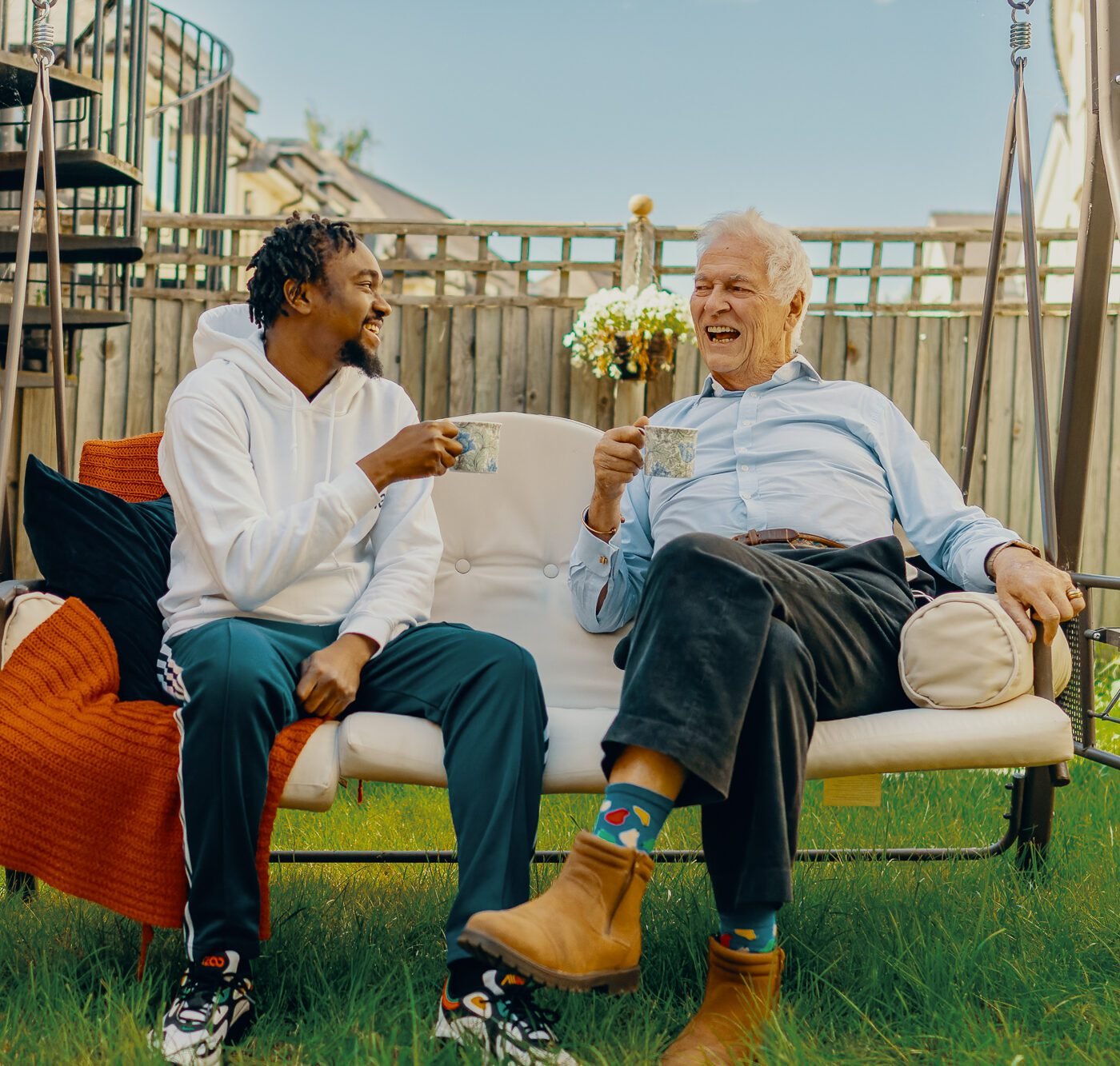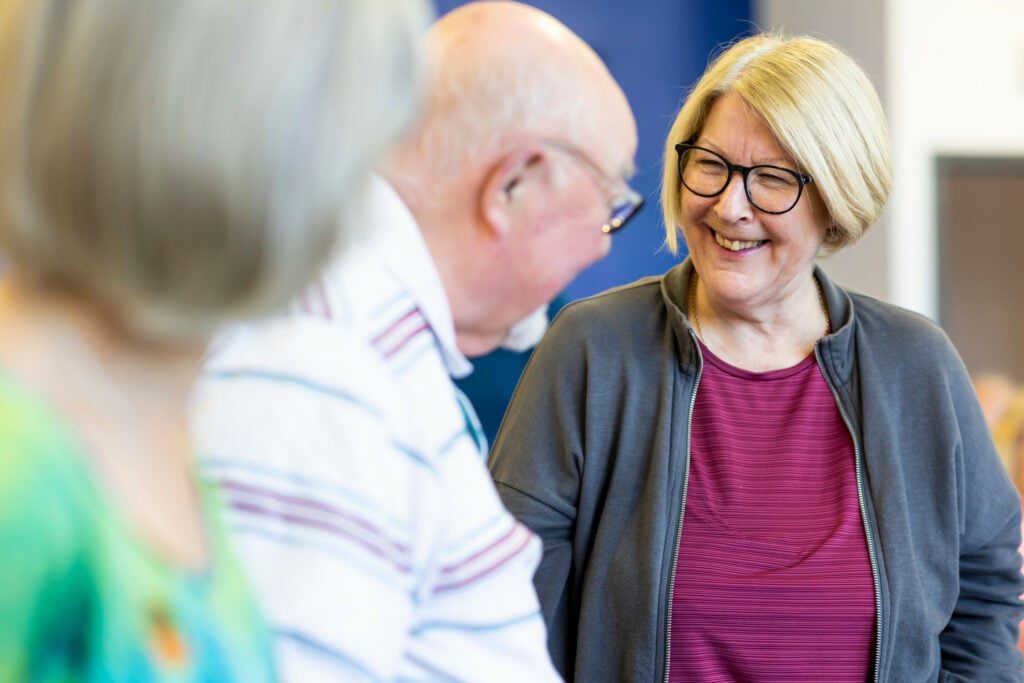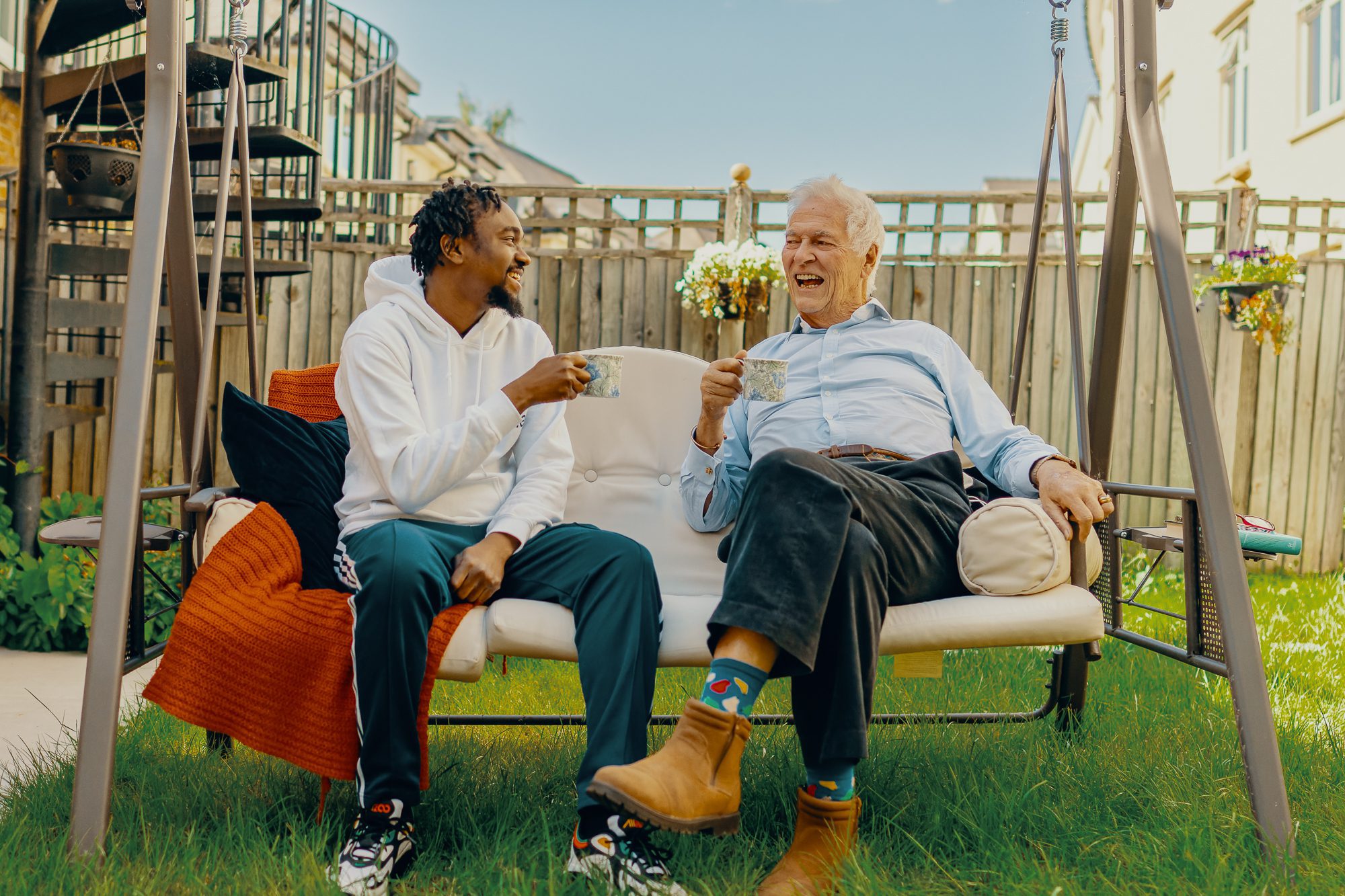Companionship care for the elderly
Loneliness can affect anyone, but it's far too common in the older generation and can impact both mental and physical health. Having a companion to chat with can help alleviate feelings of loneliness – this is where companionship care comes in.

What is companionship care?
Companionship care is offered to people who may be experiencing loneliness or social isolation for an extended period of time. They can also offer emotional support and company to those at greater risk of loneliness, such as older people who have recently lost a partner, who live far away from their family, or who find it difficult to leave their home due to ill health or limited mobility. A caregiver companion may visit the person at home or move in as a live-in carer.
Many people may think care is only for a person’s physical needs, to help make living with a complex medical condition easier, or to provide assistance with essential personal care tasks like getting washed and dressed. However, mental health is just as important to a good quality of life, and companionship care enables older people to do more of the things they love, and providing a vital link to the world and people around them.

Why is companionship so important in later life?
Our society has changed dramatically over the past few decades, and families no longer spend as much time together as they used to.
As people age, their social networks may become a lot smaller, meaning television, radio, and pets become their main source of companionship. A fear of falling may keep them from getting out and about on their own, and if they can’t drive, being alone can turn into isolation.
And, while the internet has made it easier to communicate with people all over the world. We tend to forget that many people of older generations are unfamiliar with digital technology.
Therefore it’s no surprise that according to Age UK, over 2 million people over the age of 75 live alone in England. And in the UK, 940,000 people aged over 65 in the UK admit to feeling lonely.
Christmas - it's not always a wonderful time of year
Feeling lonely or isolated can happen year-round. However 1 million older people told Age UK they are more isolated at Christmas than any other time of the year.
Winter can be isolating for many reasons. Shops and services wind down and close for the Christmas bank holidays, and older people may not feel confident going out alone in poor weather, or during dark afternoons and evenings.
Loneliness doesn’t just make people feel sad, it can have a really negative impact on how a person views themselves, how they spend their time, and their overall health. There are a wide range of reasons why older people are more at risk of loneliness, including –
- A partner passing away
- Friends passing away
- Retirement / leaving the workplace
- Children moving away and starting their own families
- Poor health or mobility
Social isolation is not the same as loneliness however they’re often lumped together. This is because you can still feel lonely even with other people around you. In Age UK’s 2024 ‘You are not alone in feeling lonely’ report they explain that loneliness is subjective and stems from the quality of our relationships. If our connections with others aren’t close and meaningful then we’re likely to feel lonely. So, while increasing social interaction is important, joining a knitting club or chatting to a neighbour over the garden fence often won’t be enough to tackle loneliness.
What types of care are available?
Often people seeking companionship care are still pretty independent. They may have low level care needs – requiring a helping hand with more strenuous tasks like vacuuming the floor, or they may be a little forgetful from time to time.
In these instances home visits from a carer can provide the regular company and assistance they need. You can arrange visits around existing routines, and schedule as many or a few as you want. It’s affordable companionship too – costing on average £16-£25 per hour.
For people who are feeling exceptionally lonely, are experiencing some health problems, or are just feeling particularly vulnerable living alone, a live-in companion carer is an ideal solution as it allows them to continue to enjoy living in their own home but also provides 24-hours of support. Live-in carers can help with many day-to-day tasks, as well as personal care such as getting washed and dressed, mobility support, and providing medication reminders.
And, on the other end of the spectrum some older people are perfectly independent and simply want someone to talk to. A number of organisations in the UK offer a range of befriending options – from monthly tea parties and gatherings, to weekly calls with volunteers. Many befriending services are offered free of charge.

What can a companion carer do?
Companion care can be arranged according to your or your loved one’s needs. Whether you want someone who enjoys a chat over a cup of tea, or who can support with daily activities like outings or shopping trips – Elderly companions help in a variety of ways to support a fulfilling and independent life.
Emotional support – providing a listening ear, reminiscing about the past, and having meaningful conversations with the person they’re caring for
Supporting interests – learning their likes and dislikes and encouraging their favourite hobbies
Meal time support – meal preparation and sharing food together
Getting out and about – planning trips, driving or accompanying them on public transport to places and appointments
Domestic tasks – helping with routine household tasks like doing the washing up and laundry, helping to keep the home tidy
Help with shopping – Making a list, helping them to find things, and carrying heavy shopping bags
Supporting social engagements – Assisting with video and phone calls, catch ups with friends and family, and attending social clubs or places of worship
The importance of continuity of care
As we’ve mentioned – it’s the quality of our relationships, not the frequency of seeing people that can have the biggest impact on our wellbeing. Therefore if you’re considering paid companionship services, being supported by the same carer, rather than a staff of changing faces will give you or your loved one a better opportunity to develop a meaningful connection. Not all care providers can guarantee this, so it’s important to ask when exploring your options.
What are the benefits of companion care?
Having someone to talk to, and interact with can make a huge differences to an older person’s day. Knowing that a visitor is coming to spend time with them is a powerful motivator to get up, bathe and get dressed in clean clothes.
Reminiscing about days gone by, interacting with other people and passing on snippets of wisdom gained over a lifetime can all help a lonely older person to re-engage with the world and maintain a sense of purpose.
‘Use it or lose it’ applies to mental ability every bit as much as it applies to physical movement, and a stimulating and engaging conversation can dispel the feeling of loneliness and boost confidence,
Wendy's story
A professional companion carer can provide company for everyday tasks that most of us may take for granted, such as eating together, playing board games and other day-to-day activities. Over time many carers become true friends with the people they’re caring for, helping to keep them happy and having fun.
It can benefit family and friends too – especially with many people living increasingly busy lives. Nearly one in four female workers aged 50-69 are balancing work with caring for a loved one. This can not only be physically draining, but makes it a lot harder to spend proper time with a loved one where you can be fully present.
A growing generation is also supporting both their own children and their elderly loved ones at the same time. Approximately 1.25 million to 2.4 million people in the UK are classified as ‘sandwich carers‘, and again these care responsibilities disproportionately fall on women.
Companion care services can help lighten the load – ensuring an older person has an additional point of contact for practical help and meaningful conversation.
The loneliness of caring for a loved one
Caring for a loved one can in itself be a lonely experience. Age UK's report found that 19% of people aged 65+ felt lonely because of the care or support they provide. Thats the equivalent of 287,000 people.
How much does companion care cost in the UK?
As we’ve alluded too already, the cost of companionship care can differ a lot depending on the level you help and support need.
While visiting care is often the most affordable form of paid companionship, you’ll be charged according to the hours of care provided. If you only need a few hours a week you may be able to keep the cost of care below £100.
However, if you’re looking for full-time support or more dedicated help with daily tasks too, the cost of visiting care may be comparable to that of full-time live in care.
Live-in care care cost upwards of £1000 a week, however, you’ll have an elderly companion with you or your loved one 24/7, and get more personalised care for your money.
You may be eligible for funding from your local council to help with the cost of care. Ask the social services department for a care assessment, this will work out if you have an eligible need for paid help. They’ll follow this with a financial assessment and look at your income and assets to understand how much money you need for care, and if you have the means to pay for it.
The Cares Family on the power of intergenerational friendships
From friendships that flourish through a shared love of music, to talking politics and putting the world to rights, at Elder we are regularly blown away by the connections that form between the live-in carers we work with, and the older people they support.We asked The Cares Family – a network of charities working to bridge the age gap, about the benefits and impact of forming friendships with people from different generations.How Elder can help with companionship care
It you’re looking for home care services, we’ve helped thousands of families connect with their ideal private companion.
Our personality matching platform is a core aspect of both our visiting and live-in care service – meaning you’ll be matched with a suitable companion based on individual needs and personality. This is an important part of finding a companion you can get on with and feel comfortable around.
More choice
Choose your own self-employed carer from our 6000+ community, and chat to them beforehand to make sure they’re the right person for you.
More control
Unlike with traditional care agencies, the care agreement will be between you and your self-employed carer, allowing you to work together to shape and control your own weekly care plan.
More value
There’s no surcharges, no hidden costs, and no joining fees. In fact, Elder is on average 35% cheaper than traditional care companies.
Joanne's story
Patricia’s carer, Rose, helps her to continue doing the things she loves such as gardening and going to the park – all with the company of her friendly carer who is now like a part of the family.
While Patricia needs a higher level of care, companionship care is available to those who may not need much care at all but instead the support of a friend.
Read more about companionship

Social groups and activities for older people
How social connections keep elderly people healthy Losing friends and family members is, unfortunately, a natural part of later life. But it can be detrimental

How can live-in care help prevent elderly mental health issues?
How can live-in care help prevent elderly mental health issues? People of any age can experience poor mental health, and as many as one in

Live-in care: can it help someone overcome loneliness?
Live-in care: can it help someone overcome loneliness? Every year, the Marmalade Trust hold their annual Loneliness Awareness Week, drawing attention to the fact that